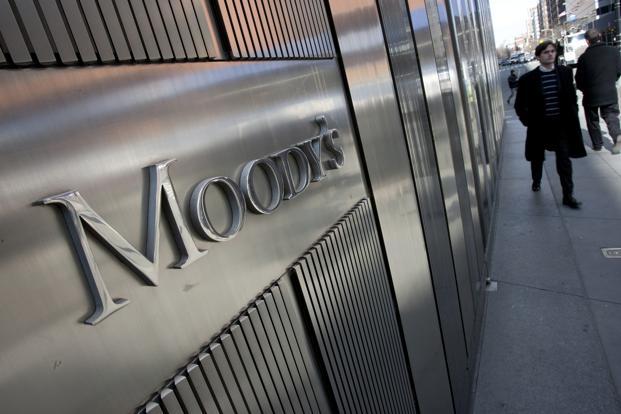Banking
FCMB, Fidelity Bank, Diamond Bank Get Moody’s First-Time Ratings

By Dipo Olowookere
Notable rating agency, Moody’s Investors Service, on Monday assigned first-time ratings to three Nigerian tier-two lenders.
The three mid-tier banks are First City Monument Bank Limited (FCMB), Fidelity Bank Plc and Diamond Bank Plc.
While the long term global scale local-currency bank deposit and issuer ratings of B2 were assigned to FCMB and Fidelity Bank, Diamond Bank had the long term B3 global scale local-currency bank deposit and issuer ratings.
A statement issued by Moody’s noted that the three mid-tier Nigerian banks account for approximately 12 percent of the country’s banking assets.
Moody’s also assigned local currency bank deposit national scale ratings (NSRs) of A2.ng to FCMB and Fidelity Bank and A3.ng to Diamond Bank.
In the statement, Moody’s explained that the primary drivers of its assessment of the banks’ standalone credit profiles were their robust loss-absorbing buffers, above its global average for similarly rated peers, and their resilient local currency liquidity buffers.
These strengths, however, are moderated by the challenging operating environment in Nigeria, as the oil and gas dependent economy slowly recovers from its 2016 recession.
Moody’s said it also incorporated one notch of rating uplift, based on a high probability of government support, from the banks’ Baseline Credit Assessments (BCA) of b3 for FCMB and Fidelity Bank and caa1 for Diamond Bank.
The B2 local-currency deposit and issuer ratings assigned to FCMB and Fidelity Bank were aligned with the ratings of the Nigerian government, the rating agency said.
For FCMB and Fidelity Bank, Moody’s has assigned a stable outlook on long-term global scale bank deposit and issuer ratings.
“The stable outlooks reflect our expectations that over the next 18 months credit costs associated with the banks’ loan portfolio will be absorbed by pre-provision profits and that overall, these banks’ credit fundamentals will continue to remain in line with peers at the B2 rating level,” the statement said.
For Diamond Bank, Moody’s has assigned a positive outlook on its long-term global scale bank deposit and issuer ratings.
It said Diamond Bank’s positive outlook reflects its expectation that elevated asset risks will decline this year on account of the resolution of some of its past due loans that have not been impaired.
“It also reflects our view that the ongoing deleveraging of the bank will improve the bank’s funding profile and support capital,” Moody’s said.
Moody’s explained that FCMB’s BCA of b3 reflects the bank’s robust levels of tangible common equity versus peers internationally.
At year-end 2017, FCMB’s tangible common equity to risk-weighted asset ratio (TCE/RWA) was 13.7 percent which compares favourably to the b3 global peer average of 11 percent.
However, the agency views FCMB’s capitalization as being moderated by the bank’s exposure to foreign currency risks.
As of December 2017, 55 percent of the bank’s loan book was denominated in foreign currency, and any further depreciation of the naira will inflate risk-weighted assets, thus reducing capital ratios.
Over the next 18 months, Moody’s expects the bank’s relatively robust pre-provision income and flat loan growth, as sought by management, to support capital.
The bank’s nonperforming loan (NPL) ratio was just 4.7 percent as of December 2017, versus the banking system NPL ratio of 15.1 percent as of September 2017.
FCMB’s exposure to upstream and midstream oil and gas sectors and foreign currency denominated loans leave the bank’s loan performance vulnerable to both global oil prices and the depreciation of the local currency, the naira.
Additionally, FCMB has significant exposure to retail loans (individuals and SMEs) of approximately 28 percent, making the bank’s asset risk more sensitive to downside scenarios than its domestic peers.
However, the rating firm expects only modest upward pressure on FCMB’s NPL ratio in 2018 as the vast majority of the bank’s oil and gas upstream and midstream portfolio has been restructured to reflect the new oil price environment and, as such, Moody’s expects many of these loans to remain performing over our outlook period.
From a liquidity perspective, the bank is able meet all its foreign currency obligations over the next 18 months with its current stock of foreign currency liquid assets.
However, the bank’s foreign currency loans to foreign currency deposits ratio of 198 percent will require the bank to continue to rely on confidence-sensitive dollar funding should the bank want to maintain its current level of foreign currency assets going forward.
Positively, a large proportion of market funds are from less confidence-sensitive development finance institutions or international banks with a developmental focus.
FCMB benefits from a strong retail franchise as indicated by its capacity to grow its retail deposits amidst a challenging operating environment.
On the asset side, although a potential source of asset risk for the bank, as highlighted above, the banks retail exposure will continue to support profitability given the high margins in this sector versus expectation of manageable credit costs going forward.
The bank’s long-term B2 local currency bank deposit rating incorporates one notch of rating uplift from its b3 BCA, based on Moody’s assessment of a high probability of government support in case of financial stress.
The high willingness to support the banks by the Nigerian government was demonstrated in the last crisis, when banks were rescued through recapitalisations and balance sheet clean ups via outright purchases of NPLs by the Asset Management Corporation of Nigeria (AMCON).
Fidelity Bank Plc
Fidelity Bank has been assigned B2 local currency bank deposit and issuer ratings, with a stable outlook. The ratings are underpinned by a standalone BCA of b3.
Fidelity Bank’s BCA of b3 reflects the bank’s resilient asset quality and relatively high provision coverage of NPLs.
As of December 2017, Fidelity Bank’s NPLs were 6.4 percent of gross loans which compares favourably against the banking system average of 15.1 percent as of September 2017.
The bank’s coverage ratio, including regulatory reserves, was 109 percent which would provide capacity for the bank to write off some of its old NPLs and reduce the ratio.
Although Fidelity Bank’s high exposure to foreign currency denominated loans is a source of risk, the bank’s exposure to the oil and gas industry is relatively low at 26 percent. The bank’s oil and gas exposure is predominantly to the upstream segment which makes up 73 percent of oil and gas loans and which has not produced any NPLs in 2017, following the restructuring of these loans.
Overall, Moody’s expects Fidelity Bank’s NPL ratio to remain stable at the current level of about 6.5 percent.
Another factor that Moody’s considered was Fidelity Bank’s relatively solid tangible common equity ratio which provides a reasonable loss absorbance buffer.
As of December 2017, tangible common equity as a percentage of risk-weighted assets stood at 15.4 percent, which is higher than the global b3 BCA peer median of 11 percent, and compares favourably against local peers.
“However, we view Fidelity Bank’s reported capitalization as being moderated by the bank’s exposure to foreign currency risks,” Moody’s said in the statement.
As of December 2017, 46 percent of the bank’s loan book was denominated in foreign currency, and any further depreciation of the naira will inflate risk-weighted assets, thus reducing capital ratios. Like many of its peers, Moody’s considers Fidelity Bank’s capacity to grow its profitability as limited because of the still difficult, although improving, operating environment and the declining yields on the bank’s government security exposures, which will limit profit retention for capital growth.
Fidelity Bank’s relatively high loans to deposits ratio of 103 percent (please note that the loan balance used in the calculation of this ratio includes on-lending facilities) indicates a tighter funding requirement than other local banks and global peers.
The bank’s deposits declined in 2017 because it transferred out government-related deposits to the Central Bank of Nigeria (CBN) on account of the Treasury Single Account (TSA).
The deposits were predominantly foreign currency deposits, and as a result, Fidelity Bnak’s foreign currency deposits declined by 51 percent, leading to a high foreign currency loans to foreign currency deposits ratio of above 370 percent.
Moody’s said it considers this to be credit negative because, although the bank is predominantly deposit funded, it will also need to rely on more expensive and confidence-sensitive non-deposit funding, which will likely strain its margins and profitability.
However, Fidelity Bank’s overall liquidity buffers are robust, with the bank’s reported liquidity ratio of 36 percent against a regulatory requirement of 30 percent.
From a foreign currency perspective, though foreign currency liquid assets are modest, they are sufficient to meet the bank’s upcoming foreign currency obligations over the next 18 months.
The bank’s long-term B2 local currency bank deposit rating incorporates one notch of rating uplift from its b3 BCA, based on Moody’s assessment of a high probability of government support in case of financial stress.
The high willingness to support the banks by the Nigerian government was demonstrated in the last crisis, when banks were rescued through recapitalisations and balance sheet clean ups via outright purchases of NPLs by the Asset Management Corporation of Nigeria (AMCON).
Diamond Bank Plc
Diamond Bank has been assigned B3 local currency bank deposit and issuer ratings, with a positive outlook. The ratings are underpinned by a standalone BCA of caa1.
The bank’s BCA of caa1 reflects its high asset risks as indicated by its relatively high Moody’s adjusted NPL ratio (which adds accounts overdue by longer than 90 days but not impaired to the impaired loans stock) and credit costs which strained profitability, especially in 2017.
Moody’s adjusted NPLs accounted for around 42 percent of gross loans as of December 2017. Diamond Bank has relatively high exposures to the oil & gas sector (predominantly the trouble midstream sector) at 52 percent of total loans as of December 2017 and a high proportion of foreign currency denominated loans that make up 46 percent of the bank’s total loans. Though credit losses will remain elevated, asset risks will decline this year on account of resolution of some of its past due loans that have not been impaired.
The bank also faces relatively tight foreign currency funding, because the bank’s foreign currency loans to foreign currency deposits of 156 percent will require the bank to rely on confidence-sensitive market funding to support its dollar assets.
Similar to other Nigerian mid-tier banks, dollar deposits contracted in 2017 and although Moody’s expects the situation to improve this year, mid-tier banks such as Diamond Bank will likely remain under some pressure because competition for these deposits has increased.
Additionally, about $330 million of Diamond Bank’s foreign currency obligations are maturing within the next 18 months, a substantial amount relative to the bank’s foreign currency liquid assets.
That said, Diamond Bank’s standalone credit profile also captures the bank’s relatively robust capital buffers and relatively low nominal leverage.
As of December 2017, the bank’s tangible common equity was 14.7 percent and its shareholders’ equity to total assets ratio was 13 percent, although this is moderated by the low provisioning.
Diamond Bank also benefits from its strong franchise as a retail bank, and therefore benefits from stable and low cost retail deposits (around 70 percent of deposits are retail deposits, which is among the highest retail ratio of any rated Nigerian bank).
In addition, Diamond Bank maintains high liquidity buffers in local currency.
As of December 2017, the bank’s reported liquidity ratio was 43 percent which provides a cushion to the minimum requirement of 30 percent.
The bank’s long-term B3 local currency bank deposit rating incorporates one notch of rating uplift from its caa1 BCA, based on Moody’s assessment of a high probability of government support in case of financial stress.
In 2013 the CBN classified Diamond Bank as a Systemically Important Bank (SIB), which supports Moody’s high willingness of support assumption.
Additionally, the high willingness to support the banks by the Nigerian government was demonstrated in the last crisis, when banks were rescued through recapitalisations and balance sheet clean ups via outright purchases of NPLs by the Asset Management Corporation of Nigeria (AMCON).
Banking
5 Smart Moves to Wrap Up Your Year in Financial Style

By Margaret Banasko
“Detty December,” Nigeria’s unofficial end-of-year spectacle, is an annual economic boom of concerts and parties, amplified by the return of the “IJGB“ (I Just Got Back) crowd. This celebration drives massive discretionary spending and consumer euphoria.
However, this festive high often leads to a financial low; the “Long January.” This is when critical non-negotiable expenses like rent and school fees hit hard.
Do not treat December as a financial free-for-all. Savvy individuals and business leaders must reframe it as the final, crucial financial quarter. The goal is to shift from emotional spending to deliberate, strategic saving.
Here are five smart, actionable financial moves that are critical for maintaining fiscal discipline that will enable you to maximize the festive season’s enjoyment while effortlessly de-risking and prepping your finances for a strong Q1 trajectory.
- Capitalize on Discounted Bill Payments: The increased consumption of utilities, airtime, and data during this period necessitates higher essential recurring costs. Smart financial governance dictates actively seeking value on these high-frequency expenditures. Pay all essential bills from electricity tokens to data bundles and Cable TV subscriptions through a platform, such as the FairMoney app, that provides a direct financial incentive or cashback on purchases. This ensures that operational necessity does not unduly drain capital, as every percentage saved on recurring utilities is capital effectively preserved for critical Q1 requirements.
- Implement the 50/30/20 Rule Strategically: Acknowledge the inevitable social expenditure of Detty December by imposing a clear framework for resource allocation. This strategic rule dictates how your income must be distributed to ensure financial security. Divide your December income into three non-negotiable categories: Allocate 50 percent of your income directly to critical January financial requirements like rent, transportation, and structured debt payments; this sum must not be compromised. Allocate 30 percent to your discretionary December wants, covering social activities, gifts, and controlled splurges; once this budget threshold is met, spending must cease. Crucially, assign the remaining 20 percent to structured savings and investment.
This 20 percent is non-negotiable and serves as the anchor for long-term wealth creation and a buffer against the Long January strain. You can automate this crucial 20 percent deduction before you even begin spending using the FairSave feature on the FairMoney App, which enables instant autosave while you earn daily interest and retain the flexibility to withdraw anytime.
- Convert Festive Windfalls into Capital: Do not view every incoming festive cash gift or unexpected bonus as mere spending money. Instead, strategically treat any financial “windfall” as a direct deposit into your future wealth accumulation. The 100 Percent Rule applies here: commit to saving or investing 100 percent of any financial gift, as this capital was not part of your planned income, offering a critical opportunity to grow your savings effortlessly. Immediately isolate any unexpected cash injections and categorize them as investment capital rather than disposable income.
By leveraging FairLock on the FairMoney App, you can save 100 percent of the festive cash into a fixed deposit. This ensures the funds are secure and illiquid, accruing interest over the stipulated savings period, which can then be released on maturity to sort out major Q1 projects or investments.
- De-Risk Your December Savings Strategy: FairMoney’s premium, revolving credit line up to ₦5,000,000, FlexiCredit, serves as a crucial liquidity shield over your protected capital. Instead of being forced to prematurely break fixed deposits or liquidate interest-earning savings accounts to cover sudden, urgent expenses such as an unexpected repair or a short-notice business need, you can immediately draw the required funds from your FlexiCredit limit.
This allows critical, ring-fenced funds to remain untouched, continue accruing interest, and maintain their full readiness for the inevitable “Long January” obligations like rent and school fees. FlexiCredit empowers the savvy individual who earns a minimum of ₦250,000 as salary to strategically manage cash flow and capture short-term high-return opportunities without depleting their primary savings or operational capital, offering immediate bridge financing, charged at a competitive 0.25 percent per day only on the amount utilized.
- Prioritize High-Value, Low-Cost Experiential Activities: While Detty December’s allure often stems from high-ticket social events and luxury venues, truly impactful celebrations are measured by the quality of connection, not the cost of admission. Instead of defaulting to expensive restaurant dinners, exclusive concerts, or impulse travel, strategically redirect your social budget toward creative, high-value experiential activities.
Organize themed potlucks with friends, host a family Christmas hangout at home, or explore local attractions like parks and museums that offer rich experiences without the premium price tag. By substituting generic, high-cost outings with thoughtful, collective events, you significantly slash discretionary spending while often increasing the depth and enjoyment of the festive season, guaranteeing maximum emotional return on minimum financial investment.
By applying these five smart moves, you assert control over your finances, ensuring you do not just survive Detty December and the Long January, but wrap up the year not just in celebration, but in financial style, positioning yourself for an empowered and prosperous New Year.
Margaret Banasko is the Head of Marketing at FairMoney MFB
Banking
Stanbic IBTC Bank Assures Continued Strategic Investment in Artists, Designers

By Aduragbemi Omiyale
The creative industry in Nigeria may have nothing to worry about with the likes of Stanbic IBTC Bank around the corner.
The financial institution, which has not hidden its love for the sector, has promised to continue with its strategic investment in the country’s designers and artists.
Speaking at an event, An Evening of Fashion, Art & Lifestyle, the Executive Director for Personal and Private Banking at Stanbic IBTC Bank, Mr Olu Delano, represented by the Head of its Private Banking Segment, Ms Layo Ilori-Olaogun, said the company was proud to be associated with the programme, which it also sponsored.
“At Stanbic IBTC, we recognise Nigeria’s creative sector as a vital driver of economic diversification, employment, and global cultural influence.
“We are proud to support the individuals behind these platforms that elevate African excellence and provide visionary talents the visibility that they deserve.
“Nights like this reaffirm our commitment to continued strategic investment in our artists and designers,” he stated.
The invitation-only ceremony, which was held at The Garden, Federal Palace Hotel, Victoria Island, Lagos, hosted by Africa’s leading luxury fashion house, 2207bytbally, in collaboration with the acclaimed art collective Torrista, brought together high-net-worth individuals, art collectors, designers, media personalities, and luxury brand executives for an unparalleled showcase of creativity and sophistication.
The evening opened with a breathtaking runway presentation featuring three signature segments from the Evolve collection by 2207bytbally: Denim, Ethnic, and 2207 Prints. Each piece exemplified the meticulous craftsmanship, bold innovation, and cultural storytelling that has established the brand as a standard-bearer in African luxury fashion.
Complementing the couture was a curated exhibition by Torrista, transforming the venue into an immersive gallery. Commissioned artworks exploring themes of culture, femininity, and evolution created a robust visual dialogue with the collections, demonstrating the seamless harmony that can result when fashion and fine art converge.
“This evening was about more than clothes or canvases; it was about showing the world that African creativity is limitless. When fashion and art share the same space, magic happens, and tonight, Lagos felt that magic,” the Creative Director of 2207bytbally, Tolu Bally, stated.
Banking
Secure IT, StockMed, 18 Others Make Wema Bank Hackaholics 6.0 Top 20 List

By Modupe Gbadeyanka
The six edition of the Hackaholics of Wema Bank Plc has produced 20 top finalists shared equally between two streams, Ideathon and Hackathon.
The Hackathon finalists are Rapid DEV, Secure IT, Neurafeed, Trust Lock Babcock, Pulse Track, IlluminiTrust, Trust Lock FUTA, Fix Fraud AI, KASH Flow and VOC AI.
The Ideathon finalists include PLOY, Fertitude, VarsityScape, Mama ALERT, StockMed, Chao, All Arbitrate, FarmSlate, Sane AI and Cycle X.
They emerged after a two-day pre-pitch held on December 16 and 17, 2025, for the grand finale slated for Friday, December 19, 2025.
They grand finale of Hackaholics 6.0 will convene the top players in Africa’s tech and innovation ecosystem, creating an avenue for these finalists to not only put their creativity to the ultimate test but also give their solutions visibility to potential investors for additional funding opportunities beyond the prizes to be won.
The prizes to be won for the Ideathon include N25 million for the winner, N20 million for the first runner-up, N15 million for the second runner-up and N5 million each for two women-led teams.
In the Hackathon category, the first to fourth-place winners will receive N20 million, N15 million, N10 million and N5 million, respectively.
The pre-pitch saw the top 43 contenders battle in a game of innovation and problem solving, presenting compelling pitches for a chance to make it to top 10 in their respective streams.
After a rigorous stretch of pitches and presentations, the top 20 emerged, securing their spot in the grand finale of Hackaholics 6.0.
“Hackaholics started off as a hackathon and morphed into an ideation. For Hackaholics 6.0, the sixth edition, we decided to give both the builders of new solutions and the refiners of existing ones, an opportunity to make meaningful impact.
“For us at Wema Bank, we understand that innovation isn’t just building from scratch. Sometimes, it’s looking at what exists and developing new ways to optimise that and create more efficiency. This is the idea behind our two-stream Ideathon-Hackathon structure.
“Every year, Hackaholics shows us just how eager and motivated Nigerian youth are when it comes to exploring creativity and innovation, and we are honoured to be the institution that provides them with the platform and resources to put this drive to good use.
“We toured seven cities, indulged 1,460 participants and discovered hundreds of remarkable ideas; some of which needed some refining and some of which deserved to move to the next stage.
“For those who needed to go back to the drawing board, we provided useful guidance and for the top contenders, we were able to shortlist to the top 43, who proceeded to the pre-pitch. To every participant, Wema Bank is proud of you. This is just the beginning,” the chief executive of Wema Bank, Mr Moruf Oseni, said.
-

 Feature/OPED6 years ago
Feature/OPED6 years agoDavos was Different this year
-
Travel/Tourism9 years ago
Lagos Seals Western Lodge Hotel In Ikorodu
-

 Showbiz3 years ago
Showbiz3 years agoEstranged Lover Releases Videos of Empress Njamah Bathing
-

 Banking8 years ago
Banking8 years agoSort Codes of GTBank Branches in Nigeria
-

 Economy3 years ago
Economy3 years agoSubsidy Removal: CNG at N130 Per Litre Cheaper Than Petrol—IPMAN
-

 Banking3 years ago
Banking3 years agoFirst Bank Announces Planned Downtime
-

 Banking3 years ago
Banking3 years agoSort Codes of UBA Branches in Nigeria
-

 Sports3 years ago
Sports3 years agoHighest Paid Nigerian Footballer – How Much Do Nigerian Footballers Earn













